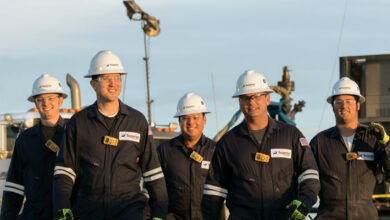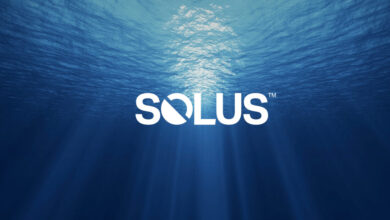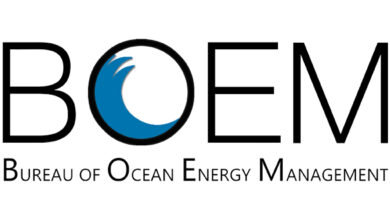At IADC Annual Meeting, drillers outlook for 2009 is mix of caution, optimism
And if you add skyrocketing shipyard construction costs to the financial uncertainty, he said, “I think the newbuild game is probably over for a while.”
Still, jackup demand around the world for 2009 is expected to remain robust, driven primarily by the Middle East, India and Mexico, he said. The US Gulf of Mexico, however, is “a different story.”
Kevin Neveu, Precision Drilling CEO, also mentioned the uncertainty brought on by the economic crisis. Yet he said he finds it surprising that, in light of the financial meltdown, commodity prices haven’t totally bottomed. Natural gas prices going from $14 to $7 and oil prices going from $140-plus to the $60s are big drops, he acknowledged. But, frankly, $7 gas and $60 or $70 oil aren’t bad – especially considering the economic situation around the world, he continued.
Shale gas production is also a short-term factor in the US market, though Mr Neveu commented: “Fact is, even with shale gas coming into its own the last couple of years, the average annual production per well is still coming down. … For a land driller, that is a good thing.”
In the long term, North America is still faced with tightening supply, as well as shortages of technologically advanced rigs and skilled personnel.
Outside the US, he noted that the short-term factors include declining production/reserves and pricing/cost challenges, as well as skilled personnel shortages. In the long term, declining production/reserves will be a factor, as will shortages of technically capable rigs and skilled workers. Geopolitical uncertainty in areas like the Middle East and Africa also will doubtlessly affect the market.
Steven Newman, Transocean president and COO, discussed the rig supply and demand picture, noting that, yes, a significant influx of new rigs are heading out of shipyards. So perhaps there is one silver lining to the current economic turmoil: The pace of newbuild announcements has slowed dramatically. In fact, some speculative newbuilds may be in trouble, perhaps with the cost of financing or the inability to get financing. “Maybe not all of the 100 floaters that have been announced will be delivered, and I think that’s a good thing,” he said.
On the energy demand side, Mr Newman reminded the audience that “depletion is a fact of life.” There’s also much debate going on over the outlook for energy demand for the next 12-18 months. Yet, beyond next year’s uncertainty, he said, long-term energy demand will certainly grow.
“The fundamentals of our business in the long term are strong. Particularly in the floater side of the business, there’s no question about what’s going to happen in terms of supply and demand.”
On the personnel side, there’s also no question that the industry will be needing tens of thousands of workers to man our new rigs. And in order to get the people we need, a global perspective is a must.
“The need for talent is worldwide. It’s no more acute in the Gulf of Mexico or Brazil or the North Sea than it is in West Africa, India or the Far East. It’s a global issue,” he said.
The industry must adopt a global mind set about talent, he urged. For example, we need to reach further into the global network of universities and technical schools. We also need to redefine the concept of an “expat.” “It’s not someone from Louisiana willing to go overseas. It’s somebody from Brazil who will work in India. Or someone from India who will work in West Africa.”
“The global scale of our business presents real global opportunities,” he said.




